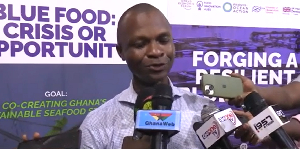PICTURE: U.S. President George W. Bush gestures as he talks to President John Kufuor of Ghana (L) and President Yahya Jammeh of the Gambia prior to their multilateral meeting with other west African leaders, at the President Palace in Dakar, July 8, 2003. Bush began a five-nation tour of Africa Tuesday aiming to prove his commitment to tackling the continent's raging problems but facing an uncertain welcome due to opposition to the Iraq war.
Bush Arrives in Senegal, Meets President
DAKAR, Senegal - President Bush's dilemma on whether to send U.S. troops to help bring peace to Liberia loomed Tuesday over an African tour meant to highlight his plans for a better future on the troubled continent.Speaking to reporters during a meeting with Senegalese President Abdoulaye Wade and the heads of seven other West African democracies, Bush said he had not yet decided on the United States' involvement in Liberia. He also repeated his demand that Liberia's president, Charles Taylor, relinquish power.
Bush said the group had "a good discussion" on Liberia. Among the leaders was President John Kufuor of Ghana, the head of the 15-country Economic Community of West African States, which has been deeply involved in talks over how to stabilize Liberia.
"We're now in the process of determining the extent of our participation," Bush said. "The U.N. is going to be involved but the U.S. will work with ECOWAS."
Upon arrival in Senegal Tuesday morning, Bush headed straight into a Presidential Palace meeting with Wade, an ally in his anti-terror campaign.
After that session, Bush and Wade met with their West African democratic counterparts: Kufuor, Mathieu Kerekou of Benin, Pedro Pires of Cape Verde, Yahya Jammeh of Gambia, Amadou Toumani Toure of Mali, Mamadou Tandja of Niger and Ahmad Tejan Kabbah of Sierra Leone.
Clusters of curious onlookers gathered on dirt roads to watch Bush's motorcade pass by, many standing with their arms folded across their chests, some clapping and waving.
It was a marked contrast to the reception given President Clinton (news - web sites) on his first Africa trip, in March 1998. Clinton's first stop, in Ghana, drew the largest crowds of his presidency, estimated at 500,000 people. Later on the same trip, thousands of people lined Senegal's streets to cheer, jump, clap, wave, sing and play drums for Clinton.
The emotional highlight of Bush's daylong visit to Senegal was a boat ride to Goree Island, just off the western coast, where he was speaking about race. Bush and his wife, Laura, were making the trip in Wade's presidential yacht.
On Goree Island, Bush was touring a slave house, built by the Dutch in 1776, where Africans were held, weighed, fed and often punished before making the long trans-Atlantic journey into servitude in America's colonies.
They left through what is known as "The Door of No Return."
Before the trip, Condoleezza Rice (news - web sites), Bush's national security adviser, gave no indication that the president would apologize for slavery.
After leaving the island, Bush departs late Tuesday for South Africa.
Bush's five-day trip to Africa, his first to the continent as president, also takes him to Botswana, Uganda and Nigeria.
Bush wants Taylor to step down to pave the way for peace in Liberia. Taylor says he is considering asylum in Nigeria, but apparently wants to see U.S. peacekeepers arrive before he leaves.
Bush has sent a U.S. military team to the capital city of Monrovia to assess the humanitarian situation before making a decision.
Nearly one-third of Liberia's 3 million people have been forced from their homes by fighting since rebels took up arms against Taylor in 1999. The three years of fighting are the latest round in an on-and-off insurrection that Taylor, then a warlord, started in 1989. Taylor is also wanted in neighboring Sierra Leone for backing rebels there who committed atrocities against civilians.
Bush chose his itinerary to represent the new Africa he hopes will emerge from such carnage.
The leaders of South Africa, Nigeria and Senegal want Western assistance for a plan they have formulated to rescue Africa; Botswana, a prosperous southern African nation, is actively confronting the AIDS (news - web sites) scourge. Uganda, a thriving east African power, is seen as an important ally in confronting potential terror networks in the region.
Many African leaders see Bush's visit as a key part of a strategy to combat rising anti-American sentiment and the image of Washington as an international bully.
Bush's decision to attack Iraq was roundly criticized in Africa, partly because of large Muslim populations in some countries, but also because America sidelined the United Nations (news - web sites). The United Nations is virtually the only stage for the continent to exert international influence.
Bush is also expected to discuss Africa's importance to his administration and to promote programs to boost U.S.-Africa trade, foster democracy in African nations, and tackle the HIV/AIDS pandemic that is devastating in sub-Saharan Africa.
Earlier....
Dakar, July 7, GNA - President John Agyekum Kufuor, on Monday arrived in Dakar Senegal to participate in a day's meeting between US President George W. Bush and eight West African heads of state. President Kufuor, who was met on arrival by the Senegalese President Abdul Wade, inspected a guard of honour mounted by the Senegalese army.
Mr Joseph Henry Mensah, Senior Minister, Papa Owusu Ankoma, Attorney General and Minister of Justice and Lieutenant General Seth Obeng, Chief of Staff accompanied the President.
Other West African leaders, who had arrived at the meeting, scheduled for tomorrow, were President Ahmed Tigan Kabbar of Seria Leone, President Matheiw Kereku of Benin, President Yaya Jammeh of Gambia, President Amadu Toumani Toure of Mali, President Mammadou Tanja of Niger and the President of Cape Verde.
The trip by President Bush, the first to Africa since he assumed the Presidency in 2001, would take him to other four countries: Nigeria, South Africa, Botswana and Uganda.
The trip was designed to improve US global image and help to establish peace and security and across the continent to make the advantages of health and literacy widely available and also help African nations to develop vibrant free economy through aid and trade.












